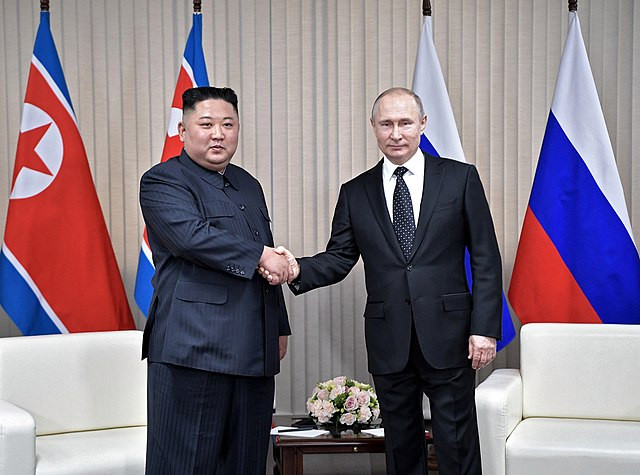North Korea has officially ratified a major defense agreement with Russia, signaling a deepening military alliance between the two countries that could escalate the ongoing war in Ukraine. The "Comprehensive Strategic Partnership" treaty, first signed in June by North Korean leader Kim Jong Un and Russian President Vladimir Putin, requires mutual military aid and cooperation across various sectors. Pyongyang's state-run Korean Central News Agency (KCNA) confirmed the ratification on November 12, noting that the treaty will be fully implemented once both sides exchange the necessary documents.
The ratification comes as reports from U.S., South Korean, and Ukrainian intelligence suggest that North Korea has deployed up to 12,000 troops to Russia's Kursk region. This move has sparked fears of a potential widening of the conflict and prompted questions about what Russia might offer North Korea in exchange for military support. "The deployment of North Korean troops in Russia's Kursk region raises concerns that it will further destabilize the Asia-Pacific region and broaden Moscow's war on Ukraine," reported South Korea's Yonhap news agency.
The treaty calls for mutual military assistance in the event of an attack on either nation and underscores both countries' commitment to establishing what they describe as a "just and multipolar new world order." It also outlines cooperation in areas including nuclear energy, space exploration, and trade, further tightening the bond between Moscow and Pyongyang. According to KCNA, Kim ratified the treaty through a decree signed on Monday, leveraging his unilateral authority in such matters.
Observers and Western officials view this development as a troubling step. "This partnership could provide North Korea with access to new military technologies from Russia, potentially enhancing its already advanced nuclear and missile capabilities," warned South Korea's intelligence community. Such a prospect is particularly alarming for the United States and its allies, who have long sought to limit Pyongyang's military advancements.
While Moscow has not directly confirmed the presence of North Korean troops on its soil, reports of their involvement in combat operations are mounting. Ukrainian officials recently stated that they have engaged in skirmishes with North Korean forces in Russia's Kursk border region. According to intelligence estimates, North Korea's troop contribution has steadily risen since the summer.
The military pact represents the largest defense deal between North Korea and Russia since the Cold War, reflecting a strategic pivot for both nations. Kim Jong Un and Putin have strengthened ties since the onset of Russia's invasion of Ukraine, a relationship that has included significant arms transfers. South Korea's spy agency reported that North Korea has sent over 13,000 containers of weapons, including artillery and missiles, to Russia since August 2023 to support Moscow's war efforts.
North Korea's stance has also grown increasingly combative. On Monday, the country's Foreign Ministry issued a statement warning the West against its continued support for Ukraine, characterizing it as a "suicidal act." The statement, which cited recent comments from Russian Foreign Minister Sergey Lavrov, accused the United States and its allies of using Ukraine as a proxy in a broader campaign against Russia. "The Anglo-Saxons intend to push the European continent to a direct armed conflict with Russia, which is a suicidal act," the ministry stated.
Lavrov himself has been vocal about what he perceives as Western provocations, warning of the consequences of Ukrainian long-range strikes against Russian territory using Western weaponry. "When economic pressure fails to sway truly sovereign nations, the West, led by the United States, resorts to threats, blackmail, and even the use of force," Lavrov said during a recent speech in Moscow.
The implications of the North Korea-Russia treaty extend beyond the battlefield. The agreement calls for joint efforts to bolster economic and technological collaboration, from nuclear energy development to trade initiatives. Kim Jong Un's endorsement of the treaty underscores North Korea's growing alignment with Russia's global ambitions, a development that has drawn condemnation from the U.S., South Korea, and European allies.




